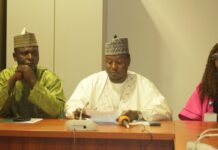Head of Federal Civil Service of the Federation, Dr. Folasade Yemi-Esan stated this at the Public Lecture as part of the programme lined up to mark the 2024 Civil Service Week.
According to her, the Civil Service is also grooming a new crop of leaders of high skills through the Leadership Enhancement and Development Programme (LEAD-P), as encapsulated in the Federal Civil Service Strategy and Implementation Plan 2021-2025 (FCSSIP 2021-2025).
She explained that under the LEAD-P, that the Service has the goal to identify, mentor and train 500 future civil service leaders by the end of 2025, adding that already over 200 officers have been trained and deployed to various Ministries, Departments and Agencies(MDAs) of government.
It would be recalled that the Leadership Enhancement and Development Programme (LEAD-P) is a top talent training course for Civil Servants in Grade Level 10-14.
As part of the programme, participating civil servants are required to undergo an 8-week internship in a private sector organisation to gain experience in efficient work processes, organisational values, ethics, innovation, and effective management styles.
The Head of the Civil Service said her Office, in partnership with the Aig-Imoukhuede Foundation, had invested hugely in the training and re-training of the workforce to ensure efficient service delivery to the citizenry.
She further stressed the need for continuous education and capacity development of the workforce, adding that capability development and talent hunt development are paramount in the Federal Civil Service.
Yemi-Esan recalled that the absence of structures and targeted programmes in the past in the Nigerian civil service was a major challenge, as many civil servants lacked skills, competencies and requisite knowledge in the discharge of their duties.
She, therefore, urged civil servants to re-dedicate themselves to building a learning culture as well as contribute meaningfully to the development of Nigeria.
Emeritus Professor and former Executive Secretary of National Universities Commission (NUC), Peter Okebukola, has provided a recipe for repositioning Nigerian civil service for effective performance in service delivery in the 21st Century.
Okebulola who was the guest lecturer at the Public Lecture as part of programmes lined up to mark the 2024 Civil Service Week, said education was key and that the kind of education needed in the workplace in 21st Century involves critical thinking, problem-solving, creativity, innovation, collaboration and teamwork, digital literacy, flexibility and adaptability, social and cross-cultural skills.
He also emphasized the need for strong leadership and accountability, entrepreneurship, use of technology, environmental literacy, resilience, and stress management, among others.
Okebulola said that the managers of the public service in the country must be forward-looking, with projections like how the civil would be in the next 50 years in terms of the provision of various services to the nation.
Yayale Ahmed, former Head of the Civil Service of the Federation, in his goodwill message said the Civil Service Week, by its well-crafted theme, has remained a true reminder and calibration of the essence and place of the Civil Service as the engine room of policy, articulation and implementation.
Ahmed, who is represented by Mr. Akin Arikawe said, the theme: “Education Fit for the 21st Century must address a shift from the conventional competencies and approach to both techniques and delivery so as to catch up with global best practices.
“This is simply a wake-up call to catch up with modern trends and ways of doing things in the Civil Service.
“To sustain and consolidate the core values of accountability, meritocracy, professionalism, loyalty and efficiency in the Civil Service, our education must be tailored towards catching up on level playing grounds with modern trends.”
The theme for this year’s lecture which was, “Education Fit For the 21st Century: Preparing Nigerian Public Servants to Address Global Challenges While Fostering Employee Engagement, Retention, and Job Satisfaction,” focused on the salient sectoral issues of grooming motivating and retaining fit-for-purpose civil servants in an environment that has globally changed and become difficult.
END












































